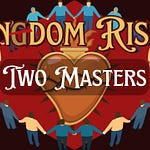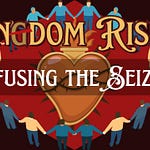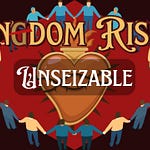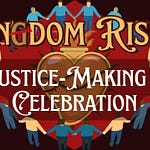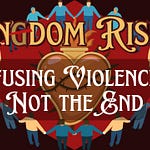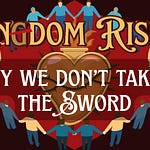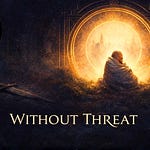The modern obsession with leaving the world began, oddly enough, with a fall. In 1827, John Nelson Darby tumbled from his horse, banged his head, and started writing a new idea into the Christian imagination. He sketched a future where the faithful are whisked away from the grit and grief of history while the rest of creation burns. A quick exit. An escape hatch. A promise that the real home is elsewhere and that the earth is disposable, like a cracked cup you set in the bin.
This is not ancient. It is not apostolic. It is recent and it is seductive. It tells a suffering people, your pain will be over soon, the plane is already boarding, no need to change anything down here.
If you have felt that tug toward evacuation, you are not foolish. You are tired. That fatigue is understandable in an age of fires measured in miles, plague-years mapped by grief, and a public life where cruelty is mistaken for strength. The promise of escape is shaped to meet that ache. It is also a lie.
The Kin-dom is already here.
That is the heart of realized eschatology, the teaching we carried in the episode and carry again in this essay. “Eschatology” means the study of last things. Realized means the future is not only ahead of us. It is breaking in now. Jesus described it as a reign spread out among us, hidden like yeast in dough, like a seed in soil, like light within the body. The Kin-dom is the web of right relationship in which all can breathe, eat, heal, and flourish. Not a passcode. Not a flight plan. The Kin-dom is a way of living.
From Despair
Despair is honest. It names what is broken. The temptation is to make despair a home. Rapture-thinking offers a furnished apartment in that neighborhood. It whispers, if the world is going to burn, the moral thing is to detach. Sell your goods. Quit your job. Leave your lease. Tell yourself it will be over soon and the pain will end. The trouble is simple. People get left behind in our leaving. Children, neighbors, the unhoused, the exhausted caregiver down the hall. And the earth herself.
We must say this plainly because our faith is not a riddle. Jesus did not ask us to decode news cycles. He asked us to feed the hungry, give water to the thirsty, clothe the naked, welcome the stranger, visit the sick and the imprisoned. These are not optional extras. They are the criteria he gave for what salvation looks like when it is walking around in a body. If we are known by our fruits, then escapism is sterile ground. It cannot grow love.
There is another reason the escape story keeps getting told. It flatters power. If we are leaving any day now, then the powerful do not have to reckon with what their choices do to air, water, soil, and bodies. If the earth is a demo model to be replaced, who cares about rivers turned to poison or forests to ash. If the poor are props in a cosmic drama, who cares whether they eat. History shows the same pattern again and again. Doctrines that separate faith from works turn out to be very useful to those who profit from our apathy.
To Discovery
Despair does not have to be destiny. What if the ache we feel is not proof that the world is ending but a summons to begin. The Kin-dom has already arrived. We do not wait for permission to love. We do not ask empire how to heal. We participate in the life that is present.
The early church learned this quickly. Expectations of an immediate ending gave way to the discovery that Christ is already here. Not absent. Present. Not awaiting return from a distance. Active in the web of relationships that make for life. If that is true, our question shifts. Instead of asking when we leave, we ask how to live. Instead of hunting for dates, we look for neighbors.
This is where realized eschatology becomes simple and practical. If the Kin-dom is here, then our daily life is the place of devotion. Prayer is our breath when we choose to share air with one another. Eucharist is the shared table where food becomes love. Repentance is not a sad impossibility. It is repair as ordinary as changing a habit, paying a debt we owe to a community, or stepping back from a lie we learned to speak without thinking.
There is an old word for hell in the gospels, Gehenna. It was a trash heap outside the city. When Jesus warns that some will be given over to Gehenna, he is not talking about a theme park in the afterlife. He is asking whether we want to live in a world organized like a dump, a society that treats people and places as disposable. The counter-picture is the Kin-dom. A shared life where no one is tossed aside.
To Devotion
Devotion is what love looks like on repeat. Not a one-time burst of zeal. A cadence. A rhythm. A set of holy repetitions that strengthen the soul for a lifetime of service. In the episode, we joked that rapture apparently means selling your Xbox and leaving a note. That is darkly funny. It is also a parable. If you can decide in a weekend to abandon your life, you can also decide in a weekend to begin again. The choice is yours. The drills are daily.
Let us choose a set of practices that make us steady, supple, and brave. Think of them as everyday drills of freedom. No need for special terms. No need for perfect conditions. We begin where we are and repeat.
1) Begin with breath and blessing.
Each morning, sit for three slow breaths. On the in-breath, say inwardly, “Here.” On the out-breath, “Now.” Place a hand on your chest and another on your belly. Say out loud: “The Kin-dom is within and among us.” This is not a trick. It is a way of waking the body to reality.
2) Touch the ground.
Step outside if you can. Touch soil, trunk, leaf, or light. Name what you feel. Cool. Rough. Wet. Warm. This is devotion, not escape. The earth is the altar. You are a priest of the living world. Ask quietly, “How can I tend you today?”
3) Choose one work of mercy.
Every day, do one small act from the list Jesus gave. Feed someone. Offer water, literal or metaphorical. Share clothing or blankets. Write a card to someone ill. Give to a bail fund or visit someone who is locked away. If you cannot leave home, support a group that does. Make the Kin-dom tactile.
4) Tell the truth with kindness.
Practice a single sentence of truth-telling to pierce a lie you meet often. Not a speech. A sentence. For example, “No one is disposable.” Or, “Health care is not a luxury.” Or, “Libraries are sacred.” Use it when the moment comes. Gentle. Steady. Clear.
5) Learn to say no.
Refuse demands from power that require you to harm your neighbor, yourself, or the earth. Start small. Decline gossip that erases someone’s dignity. Decline a purchase you know funds harm. Decline a schedule that turns you into a machine. Each no makes room for a larger yes.
6) Make and keep a neighborly promise.
Choose one ongoing commitment in your place. A monthly food distribution. A tenants’ meeting. An interfaith meal. A neighborhood garden. Keep showing up. Devotion turns from idea to muscle when it is scheduled and communal.
7) End the day with examen.
Before sleep, name one wound you witnessed and one repair you practiced. Offer both to the Holy One. If you failed, ask for strength to try again. If you succeeded, give thanks without vanity. Tomorrow you will begin again.
These are not random acts. They are kin-making acts that reveal the Kin-dom that already is. They keep us from the trap of despair and the temptation to acquiesce to the demands of power. They grow fruit where propaganda said nothing could grow. They teach the body that hope is not a mood. Hope is a practice.
The History We Carry, The Future We Choose
It helps to remember how we got here. After Darby’s invention took root, other ideas cleared the way for it. Some preachers told us we are saved by believing the right things, not by doing the right things. Others taught that destiny is already set and our actions do not matter at all. Across centuries, those messages made it easier to bless wealth, ignore the poor, and outsource responsibility to an imagined timetable. Power liked that. Power still likes that.
Creation Spirituality says no. It says the Holy is immanent, present in the soil, the river, the neighbor, the stranger. It says original blessing, not original sin, is the first truth about you. It says the Four Paths are a way to live: Awe that opens our eyes, Letting go of lies and fears, Creativity that builds what is needed, Transformation that turns wounds into wisdom. The Kin-dom is not hiding in the sky. It is shimmering in our shared life, asking to be chosen again.
Scripture keeps the edge sharp:
“The Kingdom of God is within you.”
— Luke 17:21, WEB“Inasmuch as you did it to one of the least of these my brothers, you did it to me.”
— Matthew 25:40, WEB
Read those lines slowly. If the Kin-dom is within and among us, we cannot leave without leaving Christ. If Christ meets us in the hungry, the thirsty, the sick, the imprisoned, then love is measurable and daily. Faith is not nullified by works. It is made visible by works.
A Pastoral Benediction For Beginning Again
Holy One, Light within all lights, you who kindle stars and soup kitchens, gardens and grief groups, teach us to stay. Unmask the cheap promise of escape. Give us instead the costly joy of devotion. Take our despair and convert it into discovery. Take our discovery and convert it into daily love. Let our hands become sacraments. Let our words become shelter. Let our homes become small monasteries of repair. The Kin-dom is here. Help us live like it.
Amen.
How We Keep Going
When the next prediction comes, and someone names a date for leaving, remember what Jesus said about dates and hours. Remember how relief can trick the heart. Then look around. Where are the needs at the bottom of the hierarchy. Food. Water. Shelter. Medicine. Safety. Belonging. Begin there. Begin again tomorrow. This is how we refuse the empire of abandonment. This is how we become citizens of the Kin-dom.
You are not powerless. You are not alone. You are not late. The future you long for is arriving in your next act of care. It will not trend. It might not be glamorous. It will be real. The earth is not a prison to flee. It is the body of God, aching for our touch, ready to be healed.
Creation’s Paths book: . Please share your feedback with us we want to hear your experience.
Thank you for Tips / Donations:
Substack: https://www.creationspaths.com/
New to The Seraphic Grove learn more
For Educational Resource: https://wisdomscry.com
Social Connections:
#Rapture #RaptureMyth #AntiImperialFaith #RealizedEschatology #CreationSpirituality #Christopagan
Chapters:
00:00 Introduction: Why Do Christians Want to Escape the World?
01:45 Announcements and Book Release
02:31 Has Belief in the Rapture Failed Jesus?
02:46 Biblical Context: Who Gets Taken?
04:23 Jesus’s True Criteria for Salvation
05:07 The Reformation: Luther and Calvin’s Influence
06:35 Faith Alone vs. Works: The Protestant Divide
08:01 The Fruits of Rapture Theology
09:19 The Dark Psychology of Rapture Belief
10:21 Power and the Reformation
11:25 The Great Awakenings and American Christianity
12:32 How the Rapture Enables Injustice
13:13 Realized Eschatology: The Kingdom Is Here
15:07 Offshoring Responsibility to Fiction
16:19 Imagining a Better World Through Right Relationship
18:07 The ‘I’ve Got Mine’ Mentality
18:48 Disposable Earth: Misreading Scripture
20:54 Recent Rapture Predictions and Human Suffering
22:37 Compassion for Rapture Believers
23:44 The Work We Should Be Doing
25:05 Ancient vs. Novel: The Age of Traditions



